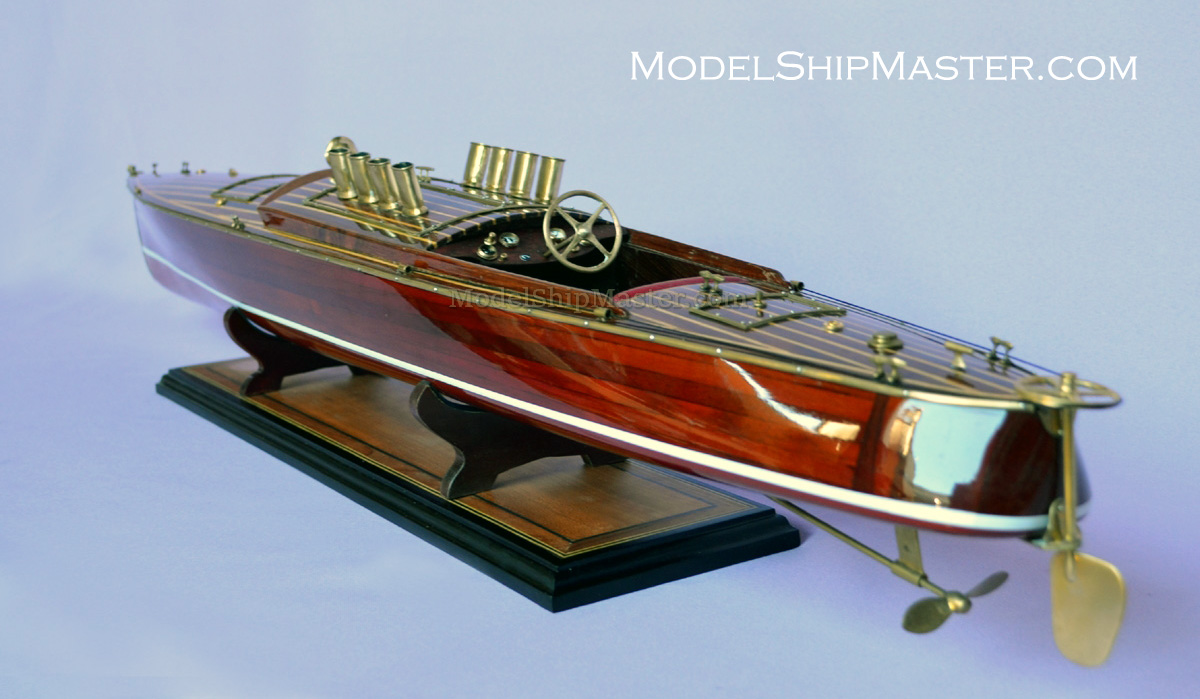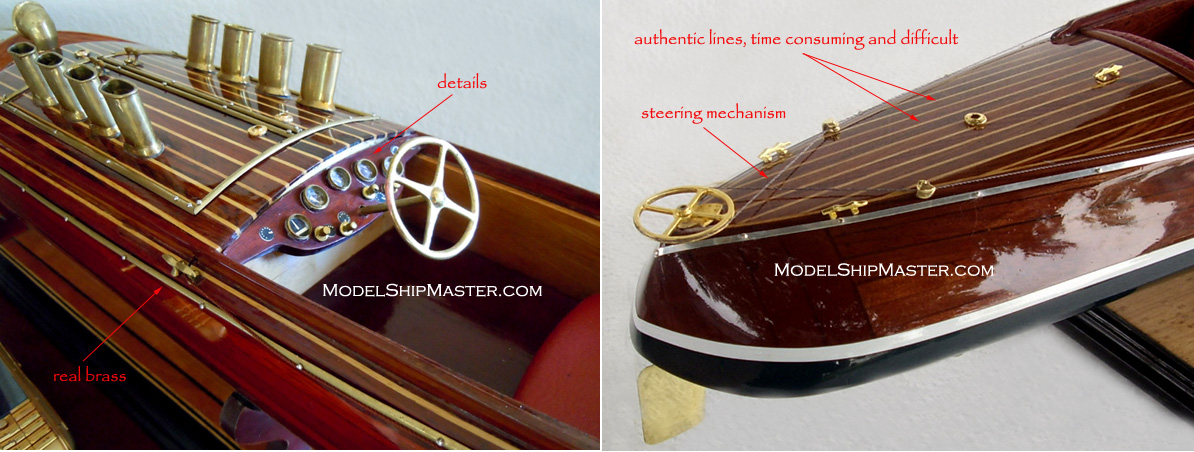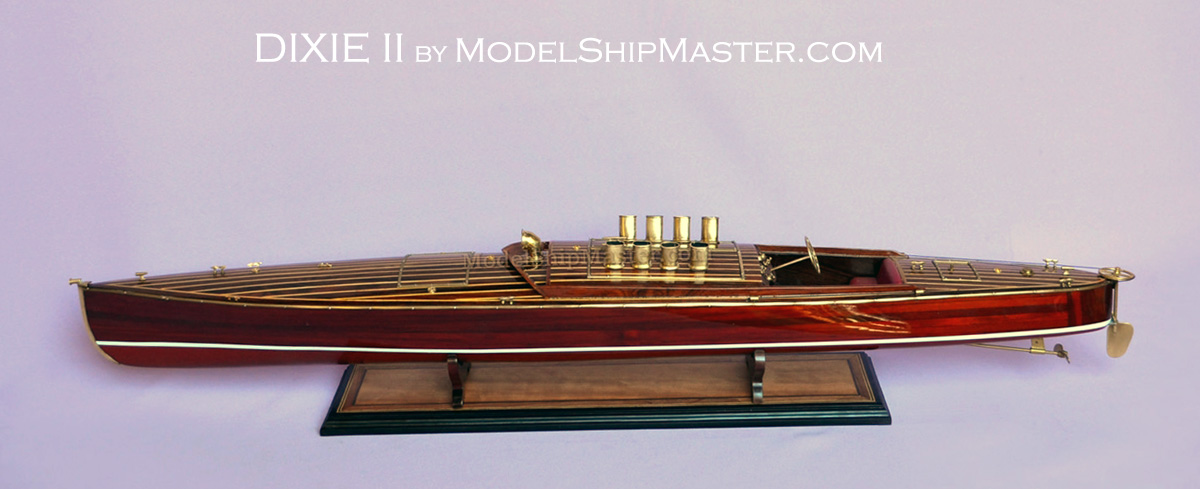|
Dixie II boat model

Dixie
II is one of the great treasures of American boating
history. She is in remarkably good condition for a
race craft that reached her 110th birthday in 2019.
Dixie II
was the fastest displacement boat in the world in her
day. In 1909 she won every race in the United States and
was shipped to Europe where she did the same thing
there. However, by 1911 she became history, after the
faster planning hull developed.
Dixie II's
record shows 100 consecutive victories including the
1908 and 1910 Harmsworth Trophy Races. She stands alone
in terms of age, success and condition as the finest
displacement hull race boat of all time.

The story below is of the greatest
motorboat race the world has ever known. It is a story that will survive forever in the
history of marine sports.
On August 3, 1908, the
Harmsworth Trophy contenders included five boats. The challenger
Wolseley-Siddeley, with her powerful hull coated in
blue-gray and the Union Jack of Great Britain on the
pole at her stern, has two six-cylinder Wolseley engines totaling 400 hp. She was 39
feet 6 inches long. The maximum cup racing
length had to be under 40 feet. England also sent over
Daimler II. Daimler II was about four inches
longer than Wolseley and equipped with three
eight-cylinder engines, totaling 525 hp, a wonderful
bunch of power in a compact-looking hull. She
carried the British man o' war flag.
Dixie II was owned by
ex-commodore E. F. Schroeder of the Motorboat Club
of America. She was equipped with an eight-cylinder
totaling 200 hp Crane & Whitman engine. The
beautiful Dixie II, with her bright varnished
mahogany marred by two hideous mufflers, temporarily
attached to fulfill the regulations.
The two other boats were
Den, owned by Commodore Joseph H. Hoadley of the
Motorboat Club of America, and U.S.A., owned by Capt. John
Sheppard of the Riverton Yacht Club. She was champion of
America as she lay there.
Captain S. Bartley Pearce
who steered the Dixie I to victory in England last
year commanded the Dixie II. Hundreds of
admiring eyes looked upon him. In the Dixie
was also the engineer Albert Rappuhn who was in the
old winner Dixie. He never left the engine for
a moment except to help Capt. Pearce out of his
rubber poncho. Captain Pearce
was a patriotic man. he was asked what flag he would
fly, that the Dixie might be recognized easily. "An
American flag, sir," he replied. "I flew it in
England and I'll fly it here."
As the race started, Dixie
was first across the line, 14 seconds after the
signal. Behind her started Den, three seconds later. Then came Daimler II and Wolseley-Siddeley,
close together, and finally the U.S.A.
Dixie had ten seconds better
of the Wolseley on the start. It was a
marvelous sight, those five boats off on a 30-knot
race to decide the championship of the world's
greatest nations. As they dashed away, they
were five little dots dwindling in the distance, but
the volume of white spray shooting yards to either
side of the boats denoted their positions to the
spectators.
When the racers came toward
the finish of the first lap, Dixie was in the lead.
Her time was 21 m. 35 s.
The Wolseley-Siddeley rushed
by 47 seconds behind. Then came U.S.A., 25:16
and then Den, 26:55. By the time Den passed the
leaders were well off on the first leg of the second
lap.
Daimler II was going like a
streak and seemed to be overhauling Dixie II. Then, just after turning the second mark, a piston
in one of her starboard engines seized, breaking a
connecting rod.
On the second lap,
Wolseley-Siddeley was reducing Dixie's lead. On this round Dixie covered the course in 22:16, Wolseley in 21:55, and there was just 16 seconds
between them. Captain Pearce was watching his
opponent. He would glance ahead and then aft.
U.S.A. and Den were now way behind, but still going
well, and ready to do their part, should anything
happen to the leaders.
On the last lap, as the
boats rounded the first turn, Dixie II was still
leading by about the same distance. Suddenly,
as the leaders neared the last turn, a cry went up
from those who were watching with glasses. "Great guns! The Dixie's
jumping away from her. He's let her out! He's let
her out!"
When Rappuhn felt himself
losing consciousness, just before the turn of the
last mark, he instinctively opened the throttle to
its limit. It was then that Dixie jumped
ahead. For four miles or more Pearce ran that
boat and held up the helpless man, shaking him and
throwing water on his head. For four miles he
held Dixie on her course with one thought on
his mind: to cross the line.
Dixie was now far in the
lead. The trophy was safe unless some miracle
happened, and no one knew then how nearly something
did happen.
The unconscious engineer had
been overcome by the carbon monoxide gas from the
mufflers. A run around the harbor revived him.
As soon as his lungs filled with the fresh air, he
recovered almost completely. The engineer ran
over and threw his arms about his captain. Pearce
threw back his head. "Old boy, we won the race, you
and me, didn't we?"
Dixie won the race with her
engine turning 750 rpm, whereas it was capable of
turning her propeller at 950. She was only of
half the power of the Wolseley -- 200-hp against 400,
and the Daimler with 525. Her hull design
played a great role in the victory.
Dixie's average speed for
her actual running time was 28 nautical miles per
hour, equivalent to 32.15 miles. This is the
fastest time ever made in a motorboat race in this
country. Dixie is indeed the fastest motorboat in the
world.

This primarily wood
Dixie II boat model is 39.5"L
x
7 T x 5.5" W $1,790
 Shipping and insurance in
the contiguous USA included.
Other places: $400 flat rate. This model is in stock and
can be ship within 5 business days.
Shipping and insurance in
the contiguous USA included.
Other places: $400 flat rate. This model is in stock and
can be ship within 5 business days.

|